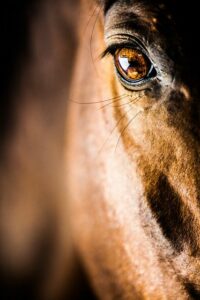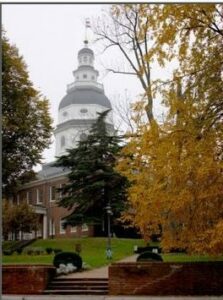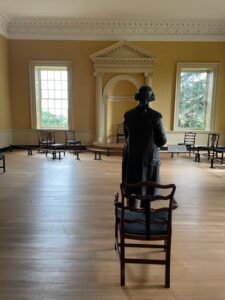Americanism Redux
October 5, 250 years ago today
A chance to watch a sporting event? hang out with friends? sip an adult beverage? in one of my favorite towns?
Count me in.
But hold up, give me a minute. I’ve got to get my best powdered wig and false teeth.
OK, got ’em. I’m ready. Let’s get going.
(Sound familiar? Well, maybe not all of it. Still, most of it seems like last weekend or next weekend to me.)
* * * * * * *
Today, 250 years ago in 1772, George Washington gets out of his carriage and steps onto the cobblestone street. What a beautiful town Annapolis is. He is in the colonial capital of the British colony of Maryland. Autumn leaves, blue sky, the aroma of fall and the sounds of life. Nothing quite like being in a port town, a coastal town, when you can sense the bustle of summer is saying goodbye. Chesapeake Bay glimmers in the sunlight. Ships with wooden masts and full sail move on the bay waters.
Long-striding in his six-foot three inch frame, Washington covers the ground quickly from the carriage door to The Coffee House. The three-building establishment is well-known in Annapolis, site of important people spending important time in important meetings. Washington enters The Coffee House and heads toward a group called the Jockey Club. A fire is going. Candles flicker on the walls and tables. Lots of friendly chatter and friendly voices. Sounds from wooden chairs and benches being scooted back a few feet. Some in the room turn toward Washington. Hat off, his wig freshly powdered. He smiles, the teeth still a good fit. Over to one of the tables and down into a seat. He is received. He is welcomed. He is included.
It’s a group of people like him—wealthy or on the wealthier side, white, male, slave-owning for the most part, and above all, keenly interested in horse racing. Washington loves riding horses, raising horses, and racing horses. Never misses a competition if he can help it. It’s said that when he climbs into the saddle, people notice and watch and stare. A special sight.
The Jockey Club is the first effort in North America to regulate horse-racing. Very first, coming up on its thirtieth anniversary by the time Washington settles into his Coffee House chair. The Club came together as a private entity to guide a pastime that people, both individually and as a community, enjoy as one of their favorite diversions. They wager lots of money and with that reality, without oversight, things could go corrupt in a hurry. The Club rides herd.
The Jockey Club is something else, too. It’s a shared space in people’s heads. They belong. They gather. They talk. They gossip and inform. They gripe and grumble. They praise and compliment. They deal with problems and dabble in solutions. They form relationships that can be vital in the most surprising situations and moments.
Washington won’t spend his entire first day in Annapolis at The Coffee House with the Jockey Club. He’ll depart for his overnight lodgings, just a few minutes’ walk down the street. To the formal house of the Maryland Governor, Robert Eden. Both Eden and Washington love horses and are veterans of the French and Indian War from a decade ago. They’ll be plenty to talk about over a final glass of wine before sleep. The big race is tomorrow.
Also
In Annapolis, when the sun goes down today, 250 years ago, the brilliant October sky gives way to an ocean of stars above. The bay waters lap quietly against the docks. The mockingbird sings in the tree veiled in darkness.
Washington likely will not sleep well; he’ll miss the bed of his wife, Martha. The house of the governor is quiet.
Not far from Washington’s guestroom bed, in the middle of a street that runs in a circle, the darkness of night covers a pile of lumber, mounds of dirt, and stacks of stone. Enslaved men and boys have gone to sleep like Washington, though they are exhausted from the day’s work at the site in the middle of the circle street. Digging, sawing, planing, chiseling, hauling. Damn, tough stuff. And the mockingbird sings.
It’s the site for the new colonial capital building. Earlier this year, the colonial legislature made the decision to tear down the old structure and replace it with something impressive, something that speaks to graceful power and elegant strength. The designer is a bit of a scoundrel, part architect, part con-man, a new immigrant from England, Joseph Horatio Anderson. One of Anderson’s boasts was that he had designed a flush toilet for a horse barn. Anderson’s credentials back in England always seem just out of reach.
The efforts of the enslaved work crew have progressed well for today, 250 years ago. Tomorrow, with the sun up, they’ll be back on the job site. Tomorrow, with the same early morning shadows, George Washington will cheer on whichever horse he bets to win or place or show.
The mockingbird will be singing again. They say 200 different songs can be heard, if you listen long enough. I wonder what the mockingbird knows.
For You Now
You may not know this. And that’s fine. But in that night of the mockingbird’s song and the darkened site in the middle of the street running in a circle is a moment that will one day cause British George to say American George is the greatest man in history.
Because one day, eleven years on from the Jockey Club horse race, that capital building is completed enough to be usable. The Congress of these United States will meet there starting on November 26, 1783.
Because one day, eleven years on from the sleepless night at the Maryland governor’s house, Congress will convene to hear a special keynote speaker of sorts. He will be George Washington. It will be December 23, 1783 and his hands will be trembling, his forehead will be sweating, his heart will be pounding. In this condition—terrified by the convergence of past, present, and future—he will stand up before the members of Congress seated in the Senate room of the Annapolis capital building to announce he is resigning as commander of the American army. Going back home. My old life. The military duty and military service end now, he will say, with the war over, the peace treaty complete, the nation secure. And when George III hears about this speech, he will say Washington is the greatest man alive because the horse-race loving Virginian gave up power, voluntarily, at the height of his popularity, influence, and authority. He rode home.
* * * * * * *
You see what’s going on around us. War and threats of worse war. Storms and a steep climb back up to normal life. Senseless crime and violence that feels poised to spread. Public pronouncements in all walks of life dismissed as half-truths or full-on lies. Iciness and bitterness among people.
It’s stacking up. Like the piles in the middle of the circled Annapolis street.
Yet, don’t forget. From the piles came a structure. In the structure came a moment. In the moment came a Cause and Purpose and Experiment. To build and stand and speak, often with the greatest resonance when the wisest action is that action not done.
You just never know who is watching and listening.
Suggestion
Stop and reflect for a moment the next time you hear the mockingbird sing.











